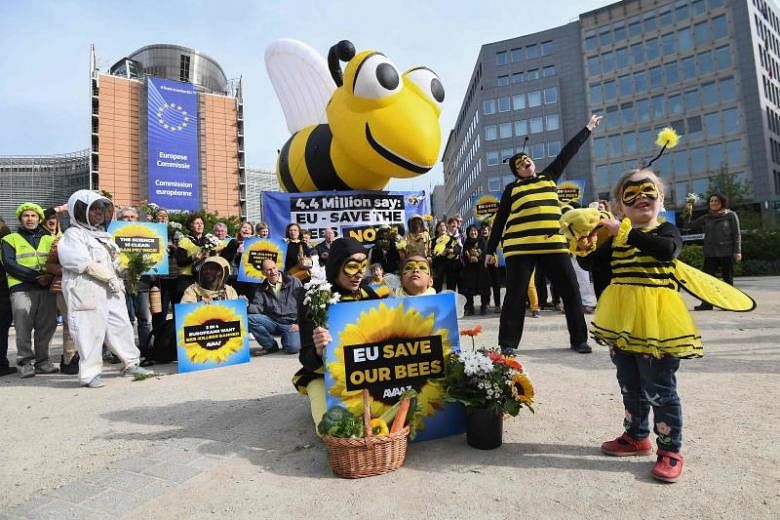BRUSSELS (AFP) - EU countries voted on Friday (April 27) for a near-total ban on insecticides blamed for killing off bee populations, in what campaigners called a "beacon of hope" for the winged insects.
Bees help pollinate 90 per cent of the world's major crops, but in recent years have been dying off from "colony collapse disorder", a mysterious scourge blamed on mites, pesticides, virus, fungus, or a combination of these factors.
The 28 European Union member states approved a ban on three neonicotinoid pesticides after the European food safety agency said in February that most uses of the chemicals posed a risk to honey bees and wild bees.
Campaigners dressed in black and yellow bee suits rallied outside the headquarters of the European Commission in Brussels ahead of the vote for a ban on three key pesticide chemicals.
EU Environment Commissioner Vytenis Andriukaitis said he was "happy that member states voted in favour of our proposal" to restrict the chemicals and tweeted a picture of the activists.
A commission statement said EU states had "endorsed a proposal by the European Commission to further restrict the use of three active substances... for which a scientific review concluded that their outdoor use harms bees."
The pesticides - clothianidin, imidacloprid and thiamethoxam - are based on the chemical structure of nicotine and attack the nervous systems of insect pests.
Brussels restricted their use in 2013 as part of efforts to protect bees and commissioned a deeper report into their effects, gathering all available studies on the issue.
Environmental groups, which have long campaigned for a ban on neonicotinoids, were abuzz about the decision.
"This comprehensive neonicotinoid ban, covering all outdoor crops, is a tremendous victory for our bees and the wider environment,' said Ms Sandra Bell, bee campaigner for Friends of the Earth Europe.
The Avaaz campaign group said that "banning these toxic pesticides is a beacon of hope for bees".
"Finally, our governments are listening to their citizens, the scientific evidence and farmers who know that bees can't live with these chemicals and we can't live without," Avaaz senior campaigner Antonia Staats said.
Unlike contact pesticides - which remain on the surface of foliage - neonicotinoids are absorbed by the plant from the seed phase and transported to leaves, flowers, roots and stems.
They have been widely used over the last 20 years, and were designed to control sap-feeding insects such as aphids and root-feeding grubs.
Past studies have found neonicotinoids can cause bees to become disorientated such that they cannot find their way back to the hive, and lower their resistance to disease.

